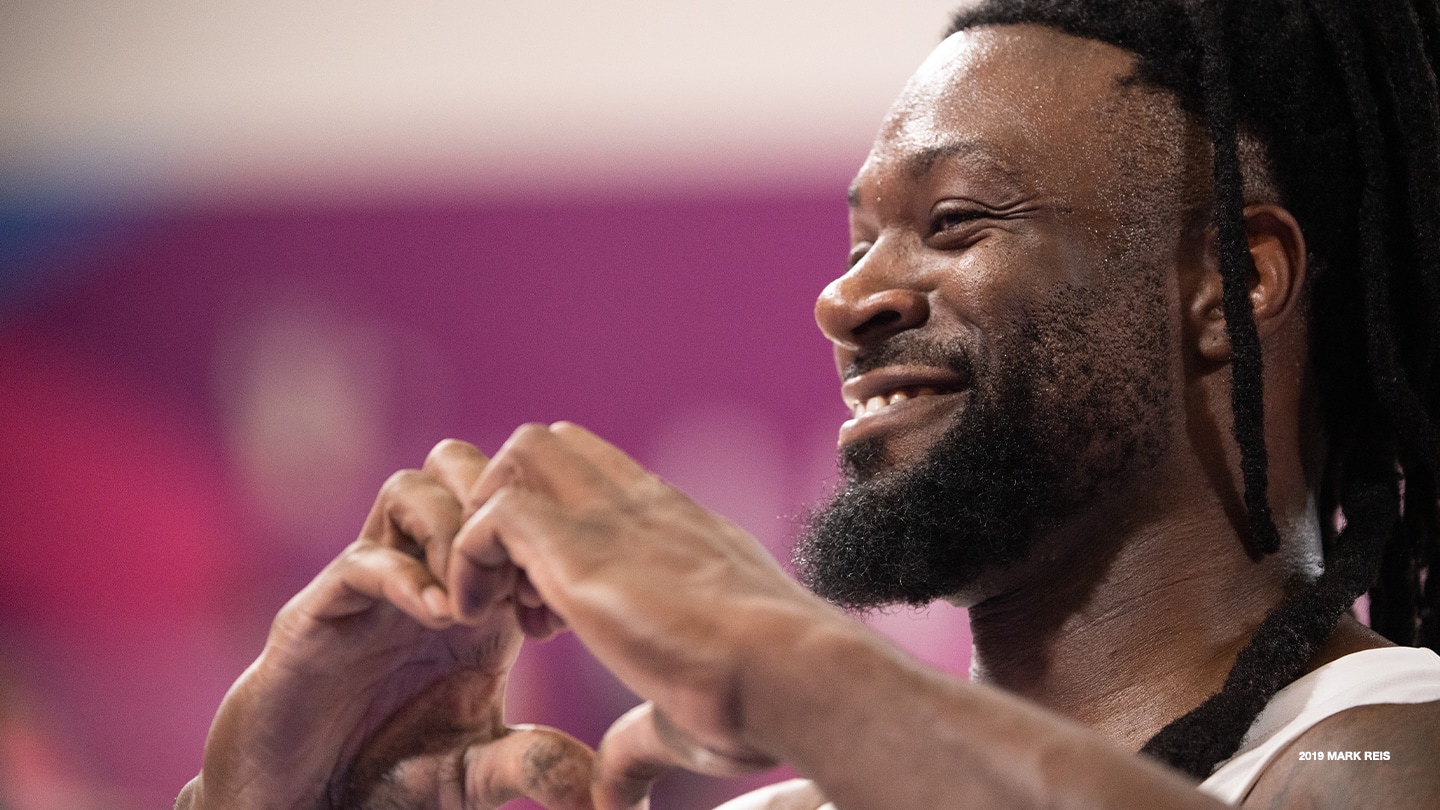
Wheelchair Basketball Player Matt Scott On His Mental Health Journey
by Matt Scott

Matt Scott smiles at the Parapan American Games Lima 2019 on Aug. 31, 2019 in Lima, Peru.
As elite athletes we are all inevitably faced with injury. The pursuit of greatness has its cost. Breaking world records, winning gold medals, and triumph after triumph — these things take a toll on your body. This comes with the territory as a Paralympian or Olympian.
Playing through pain is something I’ve become accustomed to.
Growing up old school, I’m all too familiar with the terms “brush it off, “suck it up,” and “keep it moving.” Well how about when the pain that you’re enduring isn’t physical? What about trauma experienced — losses that have absolutely nothing to do with sport, or occurrences that diminish your mental health? What then?
When it comes to matters of the mind, I have gained a great deal of perspective from playing through pain and maybe my experiences can be learned from.
As someone who takes great pride in the title of Paralympic gold medalist, knowing that my career and experiences are inspiring the next generation of Paralympic stars is something that not only elevates my mindset, but also encourages me to accomplish more. Encouragement lets me know I’m on the right track, and there’s supporters on the ride with me who I can’t disappoint.
These days I notice the young, future superstars of Paralympic sport reach out to me with not only praise, but also curiosity on how to reach their athletic goals. I love that. I welcome it. I’m inspired by it!
But in order to reach your athletic goals, you must be physically strong — as well as mentally. Thankfully, prioritizing mental fitness comes with much less of a stigma these days, and the normalization of mindfulness and meditation has really helped me personally on my journey to building a healthier mentality.
Guided meditation apps, such as Calm and Headspace are great for when you need to hit the pause button. When it comes to intense competitions, I find visualization a useful technique when I need some encouragement.
Finding what works for you can be difficult, and finding time is another problem that is not always easy to solve. But you should never be too busy to prioritize mental health, which is why I make it a part of my daily routine.
Since I am an early riser, it is easy for me to get up a bit earlier to devote a couple of minutes to clear my head and set my intentions for the day. If you aren’t able to do it in the morning, I find there are different times throughout the day where mindfulness can be implemented. Whether during your daily commute, on your lunch break or before bed. I think everyone can find a minute to work towards a positive mindset.
I’m someone who exudes positivity, and I’m very proud of that. That positive mindset is necessary for me to promote and share.
And even though opening up isn’t easy, I think writing this from a guarded space won’t allow you to grasp my journey because prioritizing mindfulness is what has enabled me to continue playing at the highest level.
The recent untimely death of my father and my lengthy 2018-2019 hospitalization that nearly took my life are painful events that are with me every single day as I try my best not to pick the scabs of those wounds.
With the additional mental strain the pandemic has caused — I’m sure you can relate — no one is immune to hardships. They are everywhere.
Finding adversity during this time has been as easy as finding evidence at a crime scene with a magnifying glass and a black light.
The most effective things that have helped me play through pain have been meditation, goal setting, personal boundaries and connecting with my loved ones. I’m finding that a solid inner circle of genuine love and respect has been such a boost of positivity that I use as fuel when I compete.
Even though face-to-face interactions are difficult right now, technology can connect anyone to anywhere in the world. Zoom, Facebook, Instagram, FaceTime — these are all platforms I use every single day to maintain my inner circle. My loved ones are what fuel me. I’ve been able to accomplish the things I have in my life due to the undying belief they all have in me.
I believe the biggest lesson I’ve learned is that I have the mental strength to not only cope with major adversity, but also thrive in it. I’ve learned to be resilient. I’ve also learned that staying mentally strong is just as important as maintaining physical strength as an athlete. Most of the time it’s even more important.
My journey with mental health has given me more knowledge of self than I’ve ever had and gives me so much confidence in my ability to pursue all of my goals both on and off the court.
If you or someone you know is experiencing a mental health issue and are looking to connect with a mental health provider please reach out to the Team USA Mental Health Support Line (24/7) at +1 (719) 866-CALL. In the process of helping yourself, you may be inspiring courage in others to seek help as well.
For more information about mental health resources please visit TeamUSA.org/MentalHealth.